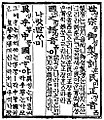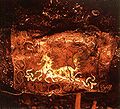National Treasures of South Korea
Jump to navigation
Jump to search
English: The National Treasures of South Korea are a numbered set of artifacts, sites, and buildings which are recognized by South Korea as having exceptional cultural value. Some of the national treasures are popular tourist destinations.
한국어: 국보(國寶)는 대한민국에서, 건축물이나 유물 등의 유형 문화재 가운데에 중요한 가치를 가져 보물로 지정될 만한 문화재 가운데에서 인류문화적으로 가치가 크고 유례가 드문 것, 독특하고 희귀한 것 등으로 인정되어 따로 지정된 문화유산을 말한다.
List of national treasures
[edit]No. 1 ~ 50
[edit]-
1. Sungnyemun, also known as Namdaemun, Jung-gu, Seoul
-
2. Wongaksa Pagoda, ten storied stone pagoda of Wongaksa temple site, Tapgol Park, Jongno-gu, Seoul
-
9. Five-storied pagoda of Jeongnim-sa, Buyeo.
-
18.한국어: 부석사 무량수전, 경북 영주시English: Muryangsujeon Hall of Buseoksa Temple, Yeongju
-
20. Dabotap at Bulguksa, Gyeongju
-
21. Seokgatap (Sakyamuni Pagoda), the three-storied pagoda at Bulguksa, Gyeongju
-
23. Cheongungyo and Baegungyo bridges, a double-sectioned staircase and bridge that leads to the entrance of Bulguksa, Gyeongju
-
24. Seokguram grotto and Buddha statue, Gyeongju
-
26. Seated gilt-bronze Vairocana Buddha statue of Bulguksa temple, Gyeongju
-
28. Standing gilt-bronze Bhaisajyaguru Buddha statue from Baengnyulsa Temple, Gyeongju
-
29. Bell of King Seongdeok. Sacred bell of King Seongdeok the Great, Gyeongju National Museum, Gyeongju #
-
30. Stone pagoda of Bunhwangsa temple, Gyeongju
-
31. Cheomseongdae, Gyeongju
-
32. Tripitaka Koreana at Haeinsa, Hapcheon County
-
35. Hyodae at Hwaeomsa
-
37. Three Storied Stone Pagoda in Guhwang-ri, Gyeongju
-
45. Seated Amitabha Buddha of Buseoksa. This very large (2.78 meters) Buddha is an incredibly rare example of a Korean image made from a wooden frame and layered clay.
-
48. Woljeongsa Octagonal Nine Story Pagoda, called the Sari-pagoda (relic pagoda)
No. 51 ~ 100
[edit]-
55. Palsangjeon Hall of Beopjusa temple, Boeun County
-
61. Celadon wine pot in the shape of a dragon, National Museum of Korea, Seoul
-
62. Geumsansa Mireukjeon (Mireukjeon Hall of Geumsansa Temple), Gimje.
-
68. Cheongja unhak sanggam mun maebyeong, the 68th national treasure of Korea. Gansong Art Museum, Seoul.
-
70. Hunmin Jeongeum was an entirely new and native script for the Korean people. The script was initially named after the publication, but later came to be known as hangul.
-
78. Gilt bronze pensive Maitreya. National Museum of Korea, Seoul.
-
79. Golden seated Buddha from the early Unified Silla Period, 8th century. National Museum of Korea, Seoul.
-
80. Gold standing Buddha from the Unified Silla period.
-
81.82. Standing Bodhisattva Maitreya (left), 719. Granite, h. 1.83 m. National Museum of Korea, National Treasure no. 81. Standing Amitabha (right), 719. Granite, h. 1.74 m. National Museum of Korea, National Treasure no. 82.
-
83. Bangasayusang, Gilt-bronze maitreya in meditation, National Museum of Korea, Seoul
-
86. Gyeongcheonsa Pagoda from Gyeongcheonsa Temple, a 10-story stone pagoda. National Museum of Korea, Seoul.
-
84. Sosan Buddha Triad, Baekje 7th century. H. of Buddha 2.8 meters, of Bodhisattva 1.7 m., of seated Maitreya 1.66 m. Yonghyon-ri, Unsan-myon, Sosan-gun, South Ch'ungch'ong Province.
-
89. Gold belt buckle excavated in Pyongyang, North Korea during the Proto-Three Kingdoms period.
-
This Silla-period terracotta figure mounted on a horse fully equipped with all trappings dates from 5〜6th century. This original sculpture, named National Treasure No. 91, conveys a strong religious undertone which is typical of many artworks from Silla.
-
92. Goryeo Dynasty-Bronze kundika inlaid with silver
No. 101 ~ 150
[edit]-
110. Portrait of Yi Jehyeon, National Museum of Korea, Seoul
-
111. Portrait of An Hyang, held by Sosu Seowon, in Yeongju
-
112. Gameunsa temple pagodas
-
117.
-
119. Yŏn'ga Buddha, Goguryeo, 539. Gilt bronze, h. 16.3 cm. National Museum of Korea
-
138. Gold Crown and Accessories, Hoam Art Museum, Yongin
-
139. Painting of a gathering of immortals by Danwon, Leeum Museum, Seoul
No. 151 ~ 200
[edit]-
154. Crown of Baekje. A pair of 30.7cm high golden cap ornaments, early 6th century (Baekje). Found in the tomb of King Munyeong, Gongju-si, Chungcheongnam-do.
-
156. A pair of king's earrings, made from gold and jade, early 6th century (Baekje). From tomb of King Munyeong.
-
162. Seoksu is a stone animal guardian which was believed to protect King Muryeong's Tomb. The figure is the 162nd National Treasure of Korea It is currently held by the Gongju National Museum
-
167. Wine ewer in the shape of a seated immortal
-
188. Gold crown from the Cheonmachong tomb
-
189 Gold hat from the Cheonmachong tomb, Gyeongju National Museum, Gyeongju
-
191. Gold crown from the Geumgwanchong tomb, Gyeongju National Museum, Gyeongju
-
195. Jar, Gyeongju National Museum, Gyeongju
No. 201 ~ 250
[edit]-
207. Cheonmado
-
216. Inwangjesaekdo, Clearing after rain in Mt. Inwangsan, painting by Jeong Seon, Hoam Art Museum, Yongin
-
217. Geumgangjeondo, Painting of Kumgangsan by Jeong Seon, Hoam Art Museum, Yongin
-
223. Geunjeongjeon Hall, located in Gyeongbokgung, Seoul
-
224. Gyeonghoeru, located in Gyeongbokgung, Seoul
-
225. Injeongjeon at Changdeokgung Seoul
-
226. Myeongjeongjeon at Changgyeonggung
-
227. The main hall, Jeongjeon, of Jongmyo royal ancestral shrine, Seoul
-
229. Water clock of Borugak Pavilion, Korean Royal Museum, Seoul
-
240. Portrait of Yun Duseo, Haenam County
No. 251 ~
[edit]-
285. Bangudae Petroglyphs
-
287. The Gilt-bronze Incense Burner of Baekje is the 287th National Treasure of Korea
-
295. Gilt-bronze Crown from the Sinchon-ri Tumulus
-
302. Buddhist painting of Cheonggoksa temple, Jinju
























































